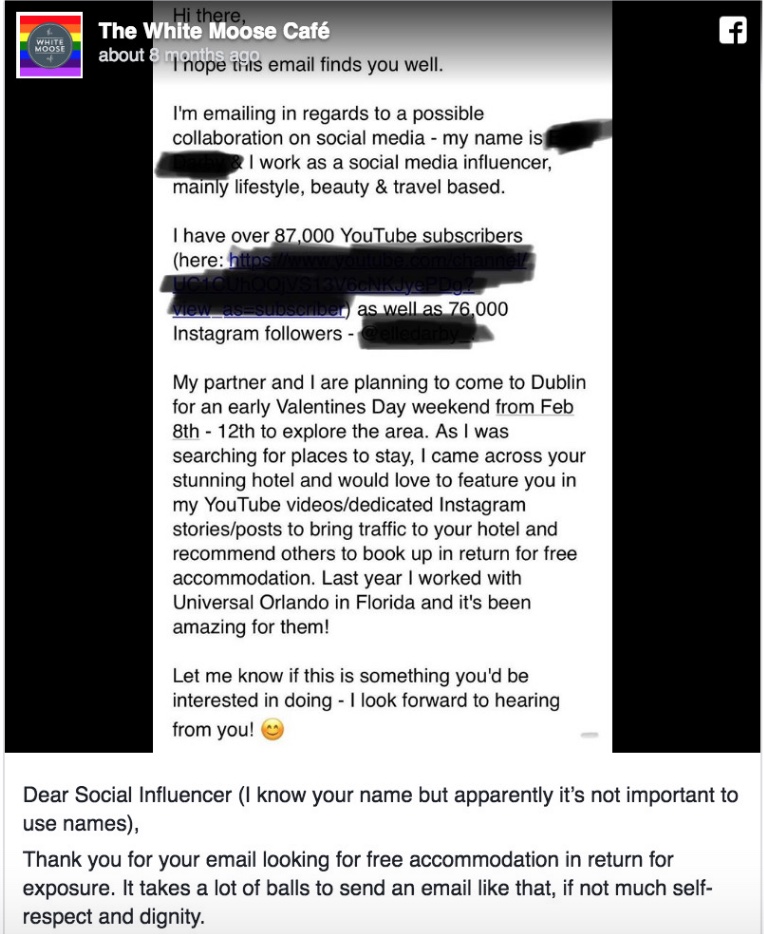Bad Influence: When to Say No to Instagrammers
Courtesy of @luxuryworldtraveler Instagram
With an increasing onslaught of hotel influencer requests – here’s how to tell the good from the bad.
With more than 800 million monthly users, Instagram has never been more powerful. But a side-effect of its success is that hoteliers are forced to sift through increasing requests from the so-called ‘influencers’ who populate the platform.
While elite influencers are often personally invited by savvy PR and marketing teams, luxury hotels today must also navigate a virtual onslaught of lesser-knowns looking for all-expense-paid holidays in exchange for a few posts.
Determining who will add value can be a minefield. Some hotels have created standardised influencer request forms, others have streamlined the process by directing requests to a specific contact — but the vast majority deal with influencer requests on a case-by-case basis via email to the hotel’s primary address.
One marketing manager at a five-star resort in the Maldives, told the Atlantic’s Taylor Lorenz that she receives at least six requests from self-described influencers per day, typically via Instagram direct message. “Everyone with a Facebook these days is an influencer,” she told the publication. “People say, ‘I want to come to the Maldives for 10 days and will do two posts on Instagram to like, 2,000 followers.’ It’s people with 600 Facebook friends saying, ‘Hi, I’m an influencer, I want to stay in your hotel for seven days,’” she said. Others send vague one-line emails like, ‘I want to collaborate with you,’ with no further explanation. “These people are expecting five to seven nights on average, all-inclusive. The Maldives is not a cheap destination.” She said that only about 10 percent of the requests she receives are worth investigating.

Some hotels have simply pulled the plug. In January, a luxury boutique hotel in Ireland made headlines for banning all YouTube and Instagram stars after a 22-year-old requested a free five-night stay in exchange for exposure. “If I let you stay here in return for a feature in a video, who is going to pay the staff who look after you? Who is going to pay the housekeepers who clean your room? … Who is going to pay for the light and heat you use during your stay? Maybe I should tell my staff they will be featured in your video in lieu of receiving payment for work carried out while you’re in residence,” the owner wrote on Facebook.
Carol Murtra is the CEO for Southern Europe of LEADERS, a global influencer marketing tech group that connects brands and influencers. She believes that saying yes to the right person requires more than a simple formula. “We use data for recruitment, activation and monitoring but there’s also magic behind the science of this — you need an understanding of what moves people.”
To avoid uncomfortable situations keep it clear from the start, she advises. “Let them know what you’d like to highlight and what you’d like to avoid. Give them freedom to express themselves but define a framework that ensures they will always be moving in safe ground for your brand.”
Gil Antolin is the founder of Luxury World Traveler, a company with 2.7 million Instagram followers that has leveraged the power of social media to create an international luxury lifestyle brand. “When you are selecting influencers to host, make sure they have a well-rounded, lifestyle page that is not too heavily focused on any specific genre,” he says. “Obviously luxury lifestyle and travel are the most preferable, but the page should not include too much nudity or anything scandalous. They should have an overall appeal that the hotel will not be embarrassed by.”
Hoteliers should also take a look at the numbers. “It’s best that they have more followers over 25-34 than under because they can afford to stay,” Antolin advises. “You want to have a good balance between men and women, typically 65/35 being the maximum threshold. The quality of content on [an influencer’s] page is also very important — make sure they create content that can be repurposed, re-shared and is a benefit to the hotel’s social media department. He recommends setting up an email address dedicated to influencer opportunities, as well as a standard form on which influencers can share these crucial analytics.

Murtra believes hoteliers should be wary, even if an influencer has a lot of followers. “It’s normally beauty or fashion influencers that have grown large audiences — it’s the main theme in their timelines, it’s a selfie-selfie-selfie profile, and everything else is secondary,” she says. “I am tired of seeing how hotels, spas, restaurants, and other services are paying fortunes to influencers so they go shoot more selfies (this time in a new background), only geo-locating the hotel or service (and if you’re lucky adding a hashtag or mention). You can normally see how unnoticed the hotel or service has been by reading the comments, none of which show interest in the hotel but rather express how pretty the influencer looks or ask about what they’re wearing.”
Journalist and media consultant Tamara Abraham agrees. “A well-chosen micro-influencer — someone with 20,000-50,000 followers — has the ability to generate more engagement and ROI than an influencer with millions of followers.”
Another common mistake is treating influencers like celebrities. “Always remember you are ‘the client’,” Murtra says. The objective of the collaboration should be perfectly defined, as should the budget. If there is no initial idea of what you’d like the influencer to be doing, it is OK to ask the influencer to give you some ideas. The back-and-forth of ideas will also help define boundaries in a natural way, as you’ll be revealing how far you want to go with the collaboration even if you didn’t know beforehand.”
Transparency is also key. “It has become increasingly important for both the hotel and the influencer to declare the nature of a partnership in each post, whether the influencer is being paid, or staying for free,” says Abraham. “Now that the influencer economy is more mainstream, it’s naïve to assume that the consumer won’t realise that an influencer’s post is effectively an ad. A lack of transparency makes them feel ‘duped’.”
So what is the best way to ensure in advance that hotels get a return on their investment? “This is the million-dollar question,” Antolin says. “Because we have our own luxury travel agency, we can track the number of hotel bookings and income generated by each post. We have a hashtag system that uses hotel identification numbers so followers can reference a post they saw in our profile. We also have a customer intake form listed in our bio that is routed to our travel agency.”

Murtra says experience trumps all. “Brands get the best return on their investment for collaborations that are not defined according to a specific number of posts or stories but rather around an experience. When you create appealing experiences for an influencer, they will post much more content than you initially expected. For example, tell an influencer you will invite him or her for their wedding anniversary, or invite the influencer with five friends to a private concert, or challenge them to fill all the rooms of the hotel for one night! Be as creative and generous as you want, but make it exciting and unique to your business.”
Influencer endorsements are time-consuming but the experts agree that it begins and ends with authenticity. “Influencers can be seen as any other conventional media, but there is one thing that sets them apart: their capacity to connect with their audience in an authentic way,” says Murtra. “This is why it is important to not get carried away with the bling-bling behind the influencer’s stats and look out for something much more powerful. Again and again it comes back to the same questions: does their content feel genuine? Do you believe it? Does it flow nicely within their timeline? Is the influencer really enjoying the experience? Bottom line; prioritise authenticity over other media metrics. Always!
By Ashley Pearson

